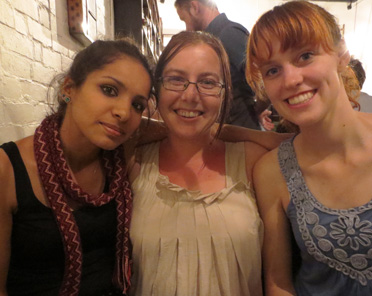.jpg) |
|
[The Household Covenant is a simple annual process for taking steps towards a more responsible way of living, focussing on seven areas of household economics. In 2015, Manna Gum will again facilitate the Household Covenant process over the season of Lent, beginning February 18. Find out more here.]
Paul Mitchell: faith that applies to life
 |
|
Jo and I decided to do the Household Covenant because it was clearly about applying faith to life. When I asked her if she’d like to follow the Lenten Household Covenant Series earlier this year, she immediately said yes. She is often agnostic, but sometimes lends herself to a belief in a spirit that connects her in a primal fashion to the earth. She said there could be no other kind of faith than that which applies to life. What else could faith be if not that? I am the ‘faith-keeper’ in our relationship, supposedly. I believe the right things, sometimes. She lives the right way most of the time, whereas I live the right way less often.
That is a long-winded introduction to a reflection on the Covenant, but I think it’s important. Any engagement a couple (or family in our case) makes with faith happens in a context. And the partners in a couple can often find themselves at different stages of belief, hope and faith. For us, the Covenant provided a platform for discussing the ways in which we would like to ‘live more mindfully’ (for Jo) and more ‘attuned to the reign of God’ (for me). It was an important point of connection that gave us a tool for thinking about where we were in our endeavours.
We found we didn’t read the scripture that was attached to each week’s Covenant item. Jo turns off when scripture turns on. A result, I think, of a Catholic upbringing during which she sat in church every Sunday, where she didn’t want to be, and listened to scripture when she’d have preferred to be listening to The Go-Betweens. I didn’t grow up in the church and my participation in the organised version has been sporadic over my 26-year faith journey. So, while I’d have liked to use the scriptures, we instead used the scripture summaries provided each week as a launchpad.
We found it hard to keep up with the process. When the series finished, we still had two reflections to do. We have one part-time teenager, one sometimes-turning-up teenager (often on Facetime), a full-time five-year-old and four careers between us (we work as professional writers/consultants and have creative writing careers as well). We struggled to find time. Which, of course, meant the work and leisure week was one in which we found much to talk about.
We didn’t find there was much for us in regard to the week on debt because we don’t have any. We rent our house and own our slowly-falling-apart car. There was an suggestion that week to think about the national/world debt issue, but we put it in the ‘too hard’ and ‘a bit too much else to think about’ basket.
The main areas we dealt with were ecology, work/leisure, giving and consumption. We have put in place some things as a direct result: we’ve worked out that our giving has to be more directed towards time/skills rather than money at the moment, due to our perpetually fluctuating and sometimes scarce income. We still give money, but we are yet to work out what shape that will take in future, i.e. will it continue sporadically as we see need, or will we give to a couple of targeted organisations each year? The jury is out.
As a result of engaging with Nick Ray’s ethical consumption organisation, we were already pretty mindful about how we shopped for food and clothing. Imperfect, but trying. Jo has told me recently we are no longer shopping at Coles. That will prove a challenge, but one worth, I think, giving a go. I’ve known about Coles’ poor relationships with their suppliers for more than a decade and yet so often found myself humming along to ‘80s songs in the cordial aisle. We have also, directly as a result of the Covenant, joined a local organic food collective. We have also decided to get to nature at least once a month. We need to do that this month. It’s difficult to find time, with kids’ weekend commitments to sport, so we might need to reframe the regularity of that one.
We also put forward a commitment to get together every couple of weeks to light a candle and pray together. That hasn’t happened yet. For Jo (I could be speaking out of turn), the prayer is the living. For me, the living needs prayer. And living. We are learning about each other’s needs and spirituality. And the Covenant provided a safe ground for us to discuss these matters.
There is much from our Covenant discussions that we haven’t put into action yet. Partly, that is my fault. I have the sheet sitting on my desk, but I don’t want to bother Jo with it too much. Softly, softly when it comes to this religious stuff. But I think I can speak for both of us when I say the Covenant represented the best of the religious stuff; an anchor for talk and action around the spirit of goodness that we both want moving in us as much as possible.
Blessed be the Covenant, the Covenant makers and all those who engaged with it.
Talitha Fraser: 'the Covenant serves me, not me it'
 |
|
“Swap super funds”, ”make a giving budget”, ”recycle water for flushing”... these are some great commitments not achieved by my Household Covenant.
It’s 2012: I’ve just finished up at a proper job and Marita (my housemate) and I have taken in an Iraqi refugee, a young woman named Shahad. We have scored a sweet deal on a low-rent, run-down Footscray house and I’ve just had a three-month sabbatical visiting Bartimaeus Co-operative Ministries (BCM) in LA and returned home dreaming “What next?”
This expressed itself in the following, annoying, way:
“At BCM, I learned about cover crops and installed a timed irrigation system. At BCM, they shower over a bucket then use that water to flush. At BCM, leftovers were upcycled into a new and different meal the next day so nothing was wasted. At BCM, they don’t let you watch TV... they don’t even have a TV!”
When the Household Covenanting series came up, it seemed like a good way for my housemates and I to go on a journey together exploring ways of living sustainably and agreeing together on what some expressions of that might look like.
Where to start? Here was one of my Household Covenant goals: “Find meaningful part-time work: one day per week in Footscray, no car, no screens.” I don’t know about meaningful, but I did some contract administration – talk about part-time – some weeks I had six days to be present in Footscray! While this part-time lifestyle opened up opportunity for great projects, it also wrought huge changes. Suddenly, my goal to “go dumpster diving” is a weekly economic necessity, my goal to “get piano lessons” isn’t financially viable and Marita’s family tradition of “donating first-income” (giving this away as ‘first fruits’ in gratitude to God) seems naive in the face of my irregular income.
We imagined spending less on coffees at cafés would pay for our sustainability initiatives, but I am instead dependent on the beneficence of my own friends if they want catch up in a café ... This was, in some ways, where the real work/learning on savings, debt and poverty took place. I came to have a real and personal understanding of doing without – doing without café coffees and inviting people to my home instead; doing without the safety buffer in my savings account and, in fear and desperation, learning to rely on God’s providing (and I received it in many ways and from sources I could not have imagined); doing without eating whatever I wanted when I felt like it and instead connecting with food seasonally by consuming food grown ourselves, sourced from Sharing Abundance and from dumpster diving ... I had to learn preserving methods, humble myself to let others pay for coffee and learn to give even though I don’t know where my next income was coming from. These are some great commitments achieved by my Household Covenant ...and I didn’t even have them written down.
I could not have foreseen that supporting Shahad might mean leaving lights on across the house overnight to manage her fear of the dark over my goal to “reduce power consumption” (darn , that was meant to be one of my easy ones). I hadn’t guessed that my goal to “buy second-hand” would need to be overruled by her desire to have nice, new things that are her own for the first time in her life (we took her to IKEA for her birthday last year and she LOVED it!). Now I could understand what Jon meant when he told us ‘...the rule serves me, not me it’. My middle-class, educated reasoned choices to dabble in downward mobility cannot mean much to someone who has never had many of the choices and opportunities I have been given and part of my covenant should be to work to redress that imbalance. Perhaps I have not strictly achieved everything I set out to do, but I am not unhappy with where I’ve ended up instead.
I do not know what will happen if you attempt a Household Covenant, but I doubt you will be disappointed or find the attempt uninteresting ... we plant daffodils and tulips every year now, although we moved house just last month and the bulbs were just tips pushing through the ground and we won’t be there to see them bloom, I wrote this:
“Reflecting today on the things we plant in the hopes of fruit to come. We believe in planting ,so we do it, but ultimately we have very little control over what grows and who it belongs to. The pain is in our awareness of this and our discipline is planting anyway.”
Now we have new housemates, new street, new garden... perhaps it is time for a new covenant.
